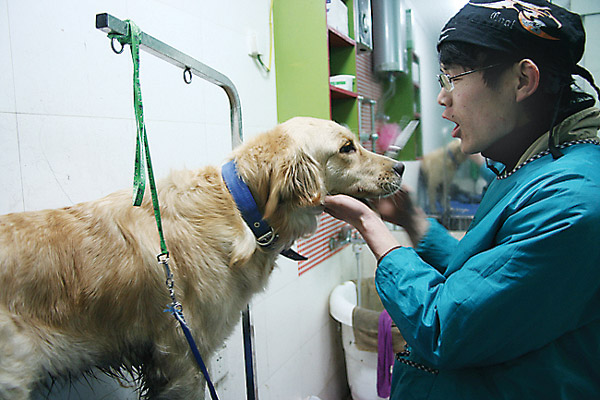Dog and cat 'hotels' give owners peace of mind
Updated: 2012-01-27 13:25
By Xing Yu (China Daily)
|
||||||||
 |
|
Zhou Lixin, a worker at the Tom Dog Pet Center in Hanshan county, Anhui province, takes care of a customer's dog. [Cheng Qianjun / For China Daily] |
BEIJING - Some pet owners who headed out of town for the holiday engaged neighbors to tend their animals. Others laid in plenty of food and water and hoped for the best.
But an increasing number turned to pet boarding services in Beijing, and they made their plans well in advance.
Lu Kaiwen, a manager of a pet supplies shop that also provides boarding, said his shop has 60 rooms for dogs and all were all booked in December.
"We are always busy during Spring Festival." Lu said.
Wang Yao, a 26-year-old white-collar worker in Beijing, has two cats. She shares a two-room apartment with two colleagues, one of whom also has a cat.
"I will be away for about seven days to go back to my hometown, and I really worry about my cats," she said before Chinese New Year. "I cannot imagine what a mess we will see after we are back, because the cats are really naughty. And my biggest concern is whether they can take care of themselves.
"But I am still not sure whether I should send them to a pet boarding service," Wang said. "My roommate said that her cat is timid and tends to have depression, so she would not send it out. My two cats had never lived together with other cats, so I am afraid that they cannot get along well with other cats."
Wang's roommate bought a cat climbing frame to entertain the cats during the days they are away.
Jin Xing said the accommodations at his cat boarding business were "already spoken for. Some regular customers even order a position at National Day holiday in October."
Jin's store charges 30 yuan ($4.70) a day for one cat during the holidays, 5 yuan higher than the normal rate.
The concept of pet "hotels" is unfamiliar in smaller cities.
Wang Qinghong, who is 53 and retired in Xingtai, Hebei province, said she had never heard of pet boarding services. Wang raises a dog.
"That is a difference between big cities and small cities, for the paces of life are different. Only a limited number of people in small cities will go out during the Spring Festival, but young people in big cities would always go back to their hometowns during the holiday," Wang said.
"And even when all my family members are out of town or traveling, I will ask my neighbors to take care of my dog."
In big cities, many young people do not know their neighbors. But that poses no pet problems for Zheng Chengyuan, 26, who works in Tianjin. His and his wife's pets are two carp.
"I chose to raise carp because I supposed that I would always be away from home during holidays. We often travel back to our hometown," Zheng said. "Carp are easy to raise, and being away for one week would bother nothing."
China Daily

 Relief reaches isolated village
Relief reaches isolated village
 Rainfall poses new threats to quake-hit region
Rainfall poses new threats to quake-hit region
 Funerals begin for Boston bombing victims
Funerals begin for Boston bombing victims
 Quake takeaway from China's Air Force
Quake takeaway from China's Air Force
 Obama celebrates young inventors at science fair
Obama celebrates young inventors at science fair
 Earth Day marked around the world
Earth Day marked around the world
 Volunteer team helping students find sense of normalcy
Volunteer team helping students find sense of normalcy
 Ethnic groups quick to join rescue efforts
Ethnic groups quick to join rescue efforts
Most Viewed
Editor's Picks

|

|

|

|

|

|
Today's Top News
Health new priority for quake zone
Xi meets US top military officer
Japan's boats driven out of Diaoyu
China mulls online shopping legislation
Bird flu death toll rises to 22
Putin appoints new ambassador to China
Japanese ships blocked from Diaoyu Islands
Inspired by Guan, more Chinese pick up golf
US Weekly

|

|







